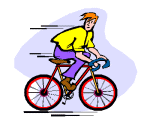
Cycling & Walking
 Cycling is often the quickest way to make short journeys. It also has the advantage that it does not release air pollution to the atmosphere, unlike motorised forms of transport. Cycling has been popular in many European countries with excellent cycle lanes segregated from main road traffic routes. In the UK, cycling has declined in popularity during the last 20 years, and now accounts for only 1% of all distance travelled by road users. In June 2000 however, the UK's first national cycle network was opened by Sustrans, the cycling charity, to encourage more people to cycle.
Cycling is often the quickest way to make short journeys. It also has the advantage that it does not release air pollution to the atmosphere, unlike motorised forms of transport. Cycling has been popular in many European countries with excellent cycle lanes segregated from main road traffic routes. In the UK, cycling has declined in popularity during the last 20 years, and now accounts for only 1% of all distance travelled by road users. In June 2000 however, the UK's first national cycle network was opened by Sustrans, the cycling charity, to encourage more people to cycle.
The provision of cycle and pedestrian routes, segregated from road networks, may encourage an increase in the number of short journeys being made by bike or foot. This could be assisted by improving cycle parking facilities at convenient locations and improving pedestrian access to and within public transport facilities.
 Walking is a sustainable mode of transport that is available to all at no cost. The safer the walking environment the better, and hence the introduction of pedestranisation to city centres in the UK has increased the number of people that travel on foot. York and Cambridge are good examples of cities where improved conditions for pedestrians have brought an increase in pedestrian traffic. In the UK it has been found that 50% of all journeys are under two miles, and therefore are ideal for cycling or walking. Walking and cycling are also extremely healthy modes of transport, as they increase physical fitness.
Walking is a sustainable mode of transport that is available to all at no cost. The safer the walking environment the better, and hence the introduction of pedestranisation to city centres in the UK has increased the number of people that travel on foot. York and Cambridge are good examples of cities where improved conditions for pedestrians have brought an increase in pedestrian traffic. In the UK it has been found that 50% of all journeys are under two miles, and therefore are ideal for cycling or walking. Walking and cycling are also extremely healthy modes of transport, as they increase physical fitness.
Websites
Other topics
• Sustrans
• TravelWise
• Cycling North West
• DETR
• DETR
• Cyclists Touring Club
• DETR
• DETR
• Introduction
• Agenda 21
• Agriculture
• Air Pollution
• Biodiversity
• Biofuels
• Brundtland Report
• CHP
• Conservation/Preservation
• Cycling & Walking
• Doing Our Bit
• Earth Summit
• Energy
• Energy Efficiency
• Energy from Waste
• Forests
• Fossil Fuels
• Geothermal Energy
• Human Health
• Hydroelectric Power
• Indicators
• Land Use Planning
• Local Agenda 21
• Nuclear Power
• Population
• Poverty
• Power Generation
• Public Transport
• Renewable Energy
• Solar Energy
• Sustainable Development
• Tidal Power
• Transport
• Transport Impacts
• Transport Solutions
• UK Strategy
• Waste
• Waste Disposal
• Waste Recycling
• Water Quality
• Wave Power
• Wind Power
 Print Topic
Print Topic